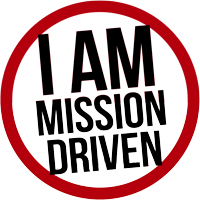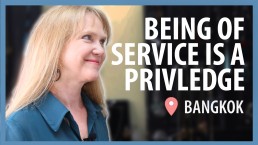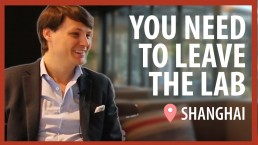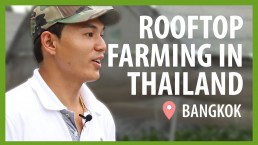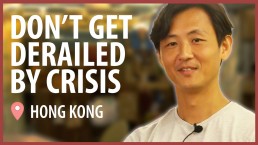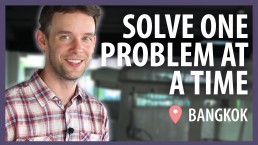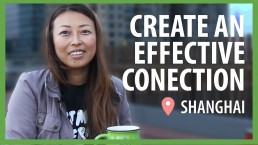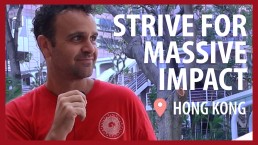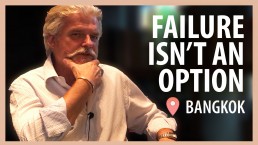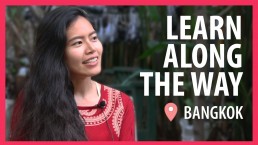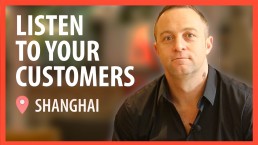Delivering Hope & Opportunity in Bangkok | Annie Dieselberg, Nightlight International
In this interview of Entrepreneurs For Good, I speak with Annie Dieselberg, founder of Nightlight International in Bangkok, about her work to build an organization that has helped more than 150 women leave Bangkok's sex trade through job training, counseling, and empowerment programs.
Through this discussion, we speak a lot about complexity of the challenges that she must address as part of this process, how that shapes her organization, and the importance of having a strong leadership team that can help deliver on the vision.
About #EntrepreneursForGood Series:
Through this series, we speak with Asia based entrepreneurs whose mission it is to bring solutions to the environmental, social, and economic challenges that are faced within the region to learn more about their vision, the opportunities they see, and challenges that they have had to overcome.
It is a series that we hope will not only engage and inspire you, but catalyze you and your organizations into action. To identify a challenge that is tangible, and build a business model (profit or non) that brings a solution to the market
About Annie:
Annie Dieselberg is the CEO and co-founder of NightLight International. Annie has a passion to see women and children freed from the sexual exploitation of prostitution and trafficking, and to see the global church and community working together to free, heal, and restore all who have been broken and wounded through the sex trade. Spending her formative years growing up in Congo, Belgium, Thailand, and India, Annie developed a heart for the marginalized and a passion against injustice.
Annie and her husband Jeff, were sent by International Ministries to Bangkok in 1994 where Annie assisted the director of a local Compassion International project doing visitations in slum communities and volunteered at Rahab Ministry doing bar outreach among women in prostitution.
NightLight was founded in 2005 with the purpose of providing holistic alternative employment to women at risk or escaping sexual exploitation. NightLight Design, the jewelry business has employed over 160 Thai women since 2005. NightLight Foundation works to prevent, intervene, rescue, and rehabilitate women and children from sexual exploitation and trafficking.
Annie is a love revolutionary determined to see the dark places where sexual exploitation takes women and children captive, transformed into places of hope, freedom, and opportunity.
Follow :
NightLight Foundation: https://www.nightlightinternational.com
Personal Website: https://anniedieselberg.com
Twitter: https://twitter.com/annie4nl
About Rich:
Driven by the belief that change begins with a single step, Richard Brubaker has spent the last 15 years in Asia working to engage, inspire, and equip those around him to take their first step. Acting as a catalyst to driving sustainability, Brubaker works with government, corporate, academic and non-profit stakeholders to bring together knowledge, teams, and tools that develop and execute their business case for sustainability.
Follow Rich
Website: http://www.richbrubaker.com
Facebook: https://www.facebook.com/rich.brubaker
LinkedIn: https://www.linkedin.com/in/richbrubaker
Instagram: https://instagram.com/richbrubaker
Twitter: http://www.twitter.com/richbrubaker
Contact Rich
[email protected]
Investing & Incubating in Water Startups | Maarten Ter Keurst, Pureterra Ventures
With fewer issues more important in the area of sustainability than water, on this episode of Entrepreneurs For Good I sat down with Maarten Ter Keurst from Pureterra Ventures in Shanghai to talk about the work of his fund to identify and incubate water startups.
Identifying, and executing investments aside, where I think this interview will be of particular interest to entrepreneurs is the work that that they do to help entrepreneurs commercialize their idea through supporting the development of leadership and business skills. A challenge he says "entrepreneurs" face as the move from the lab to the market.
About #EntrepreneursForGood Series:
Through this series, we speak with Asia based entrepreneurs whose mission it is to bring solutions to the environmental, social, and economic challenges that are faced within the region to learn more about their vision, the opportunities they see, and challenges that they have had to overcome.
It is a series that we hope will not only engage and inspire you, but catalyze you and your organizations into action. To identify a challenge that is tangible, and build a business model (profit or non) that brings a solution to the market
About: Maarten
Maarten has consulted foreign SMEs in the water sector on market entry strategy in China for 5 years and has worked for CHC’s investment arm since 2015. He is an expert in deal structuring, managing Chinese networks, partner selection and has an intimate knowledge of the Chinese water technology sector. He holds a MSc in Economics from Tilburg University
Follow :
PureTerra Ventures: https://pureterra.com/
LinkedIn: https://www.linkedin.com/in/maartenterkeurst/
About Rich:
Driven by the belief that change begins with a single step, Richard Brubaker has spent the last 15 years in Asia working to engage, inspire, and equip those around him to take their first step. Acting as a catalyst to driving sustainability, Brubaker works with government, corporate, academic and non-profit stakeholders to bring together knowledge, teams, and tools that develop and execute their business case for sustainability.
Follow Rich
Website: http://www.richbrubaker.com
Facebook: https://www.facebook.com/rich.brubaker
LinkedIn: https://www.linkedin.com/in/richbrubaker
Instagram: https://instagram.com/richbrubaker
Twitter: http://www.twitter.com/richbrubaker
Contact Rich
[email protected]
Hydroponic Rooftop Farming in Bangkok | Tong Horsuwan, Bangsai Agricultural
In this episode of Entrepreneurs For Good, I speak with Tong Horsuwan about his work to build, and operate, more than 20 rooftop farms in Bangkok.
Easily one of the most exciting conversations I have had to date, this 25 millennial has not only set up more than 20 rooftop farms, he has also built an APP that monitors his farms, but also begun the process of building robots that will help harvest the crops!
It has been a process of trial and error, but where he has not only found a business model, and strong customer base, but where he is now developing process and technologies that will help him take the business to the next level.
About #EntrepreneursForGood Series:
Through this series, we speak with Asia based entrepreneurs whose mission it is to bring solutions to the environmental, social, and economic challenges that are faced within the region to learn more about their vision, the opportunities they see, and challenges that they have had to overcome.
It is a series that we hope will not only engage and inspire you, but catalyze you and your organizations into action. To identify a challenge that is tangible, and build a business model (profit or non) that brings a solution to the market
About Tong:
Tong trained in urban farming under his father, Makavan Horsuwan, a well-known innovator in the development of hydroponic growth tables and trays, a technology which allows for simple modular expansion per space available.
About Rich:
Driven by the belief that change begins with a single step, Richard Brubaker has spent the last 15 years in Asia working to engage, inspire, and equip those around him to take their first step. Acting as a catalyst to driving sustainability, Brubaker works with government, corporate, academic and non-profit stakeholders to bring together knowledge, teams, and tools that develop and execute their business case for sustainability.
Follow Rich
Website: http://www.richbrubaker.com
Facebook: https://www.facebook.com/rich.brubaker
LinkedIn: https://www.linkedin.com/in/richbrubaker
Instagram: https://instagram.com/richbrubaker
Twitter: http://www.twitter.com/richbrubaker
Contact Rich
[email protected]
Keeping a Positive Mindset | Eric Swinton, V Cycle
In this episode of Entrepreneurs For Good, I speak with Eric Swinton, founder of V Cycle, about building V Cycle, an organization whose mission is to rid the world of plastic and the progress he has made over the last year with the launch of his 10 ton challenge.
A challenge that is engaging a number of communities on the issues of plastic waste, while at the same time, bringing additional income for a number of elderly recylcers.
While fulfilling, the progress hasn't come easy, and in this interview we not only talk about the challenges of building V Cycle, but how he is able to maintain his emotional balance through the ups and downs.
About #EntrepreneursForGood Series:
Through this series, we speak with Asia based entrepreneurs whose mission it is to bring solutions to the environmental, social, and economic challenges that are faced within the region to learn more about their vision, the opportunities they see, and challenges that they have had to overcome.
It is a series that we hope will not only engage and inspire you, but catalyze you and your organizations into action. To identify a challenge that is tangible, and build a business model (profit or non) that brings a solution to the market
About Eric:
Eric is the founder of V Cycle, a social enterprise that is tackling Hong Kong’s environmental issues on both an ecological and human level. V cycle provides environmental education to schools, businesses, and the general public on plastic reduction and responsible recycling. At the same time, V Cycle collects different types of plastic waste in Hong Kong and repurpose them into high- value products, while creating job opportunities and caring for elderly waste pickers and adults with special needs.
Follow :
About Rich:
Driven by the belief that change begins with a single step, Richard Brubaker has spent the last 15 years in Asia working to engage, inspire, and equip those around him to take their first step. Acting as a catalyst to driving sustainability, Brubaker works with government, corporate, academic and non-profit stakeholders to bring together knowledge, teams, and tools that develop and execute their business case for sustainability.
Follow Rich
Website: http://www.richbrubaker.com
Facebook: https://www.facebook.com/rich.brubaker
LinkedIn: https://www.linkedin.com/in/richbrubaker
Instagram: https://instagram.com/richbrubaker
Twitter: http://www.twitter.com/richbrubaker
Contact Rich
[email protected]
Manufacturing Electric Vehicles in Bangkok | Dennis Harte, Tuk Tuk Factory
There are few things more iconic to Bangkok than the Tuk Tuk.
They are loud, fast, and belch some of the most toxic two cycle fumes imaginable, but as a primary means of transportation for many, they are essential part of getting around Bangkok.
For Dennis Harte, he has spent the last 10 years building his company, the Tuk Tuk Factory, on out outskirts of Bangkok with the hopes to deliver electric Tuk Tuks to the market, and through this episdoe of Entrepreneurs For Good,I learn about his commitment to delivering on that vision.
About #EntrepreneursForGood Series:
Through this series, we speak with Asia based entrepreneurs whose mission it is to bring solutions to the environmental, social, and economic challenges that are faced within the region to learn more about their vision, the opportunities they see, and challenges that they have had to overcome.
It is a series that we hope will not only engage and inspire you, but catalyze you and your organizations into action. To identify a challenge that is tangible, and build a business model (profit or non) that brings a solution to the market
About Dennis:
Dennis Harte is co-founder and Chief Operations Officer Thailand, of the Tuk Tuk Factory.
Established in 2011, Tuk Tuk Factory has been producing its e-tuks with cargo, limousine and vending versions of the vehicle available to consumers.
Dennis Harte was the winner of the Expat Entrepeneur Award: Manufacturing in 2014.
Follow Dennis:
http://www.tuktukfactory.com/
https://www.facebook.com/TukTukFactory
About Rich:
Driven by the belief that change begins with a single step, Richard Brubaker has spent the last 15 years in Asia working to engage, inspire, and equip those around him to take their first step. Acting as a catalyst to driving sustainability, Brubaker works with government, corporate, academic and non-profit stakeholders to bring together knowledge, teams, and tools that develop and execute their business case for sustainability.
Follow Rich
Website: http://www.richbrubaker.com
Facebook: https://www.facebook.com/rich.brubaker
LinkedIn: https://www.linkedin.com/in/richbrubaker
Snapchat: http://snapchat.com/add/richbrubaker
Instagram: https://instagram.com/richbrubaker
Twitter: http://www.twitter.com/richbrubaker
Contact Rich
[email protected]
Converting China to a Plant Based Vegan Diet | Grace Han, Plant Based News
If you are wondering why, and why the growth rates are likely to only continue to grow, then you should want my recent interview of Grace Han where we speak about her own transition to veganism, her work as an advocate for veganism, and why she thinks firms like Beyond and Memphis Meats are game changers.
Based in London, Grace regularly travels to China as part of her passion to support the vegan movement, and the organizations that are advocating for it.
A former meat eater herself, she provides a lot of interesting insights into the motivations for why the vegan lifestyle, and in this episode of Entrepreneurs For Good, we talk through our shared belief that the new generation of plant based proteins are going to prove to bring a massive shift in the adoption of veganism.
About #EntrepreneursForGood Series:
Through this series, we speak with Asia based entrepreneurs whose mission it is to bring solutions to the environmental, social, and economic challenges that are faced within the region to learn more about their vision, the opportunities they see, and challenges that they have had to overcome.
It is a series that we hope will not only engage and inspire you, but catalyze you and your organizations into action. To identify a challenge that is tangible, and build a business model (profit or non) that brings a solution to the market
About: Grace
Grace Han is a Senior UX Designer, she is also the co-founder and Managing Director of UK charity Towards a Compassionate Nation (TACN.ORG). She has been helping Animal Equality, Veganuary, Viva!, Mercy for Animals and many other non-profit organisations promote their campaigns in China. Throughout the years Grace has built a wide network of contacts in Beijing, including local NGOs, vegan businesses, vegan individuals and skilled volunteers, along with the team at TACN they have organised many vegan outreach and educational social events in Beijing.
Follow :
Plant Based News: https://www.plantbasednews.org
Facebook: https://www.facebook.com/veganhumangrace/
Twitter: https://twitter.com/g_han
Instagram: https://www.instagram.com/g_han
About Rich:
Driven by the belief that change begins with a single step, Richard Brubaker has spent the last 15 years in Asia working to engage, inspire, and equip those around him to take their first step. Acting as a catalyst to driving sustainability, Brubaker works with government, corporate, academic and non-profit stakeholders to bring together knowledge, teams, and tools that develop and execute their business case for sustainability.
Follow Rich
Website: http://www.richbrubaker.com
Facebook: https://www.facebook.com/rich.brubaker
LinkedIn: https://www.linkedin.com/in/richbrubaker
Instagram: https://instagram.com/richbrubaker
Twitter: http://www.twitter.com/richbrubaker
Contact Rich
[email protected]
Overcoming Limitations to Achieve Massive Social Impact | Jeff Rotmeyer, ImpactHK
In this episode of Entrepreneurs For Good,, I speak with ImpactHK Founder Jeff Rotmeyer to talk about the work that he is doing with some of Hong Kong's most vulnerable populations.
It is an inspiring 20 minutes, with a lot of great insights into how Jeff started building a community of individuals who were taking simply actions to increase awareness and bring a little joy, to going where other organizations would not to bring "massive impact" and change lives.
It is a fun interview, and I'm happy to note that since the filming of this interview, he successfully raised a substantial amount of funding and is now taking ImpactHK to a whole different level.
About Entrepreneurs For Good Series:
Through this series, we speak with Asia based entrepreneurs whose mission it is to bring solutions to the environmental, social, and economic challenges that are faced within the region to learn more about their vision, the opportunities they see, and challenges that they have had to overcome.
It is a series that we hope will not only engage and inspire you, but catalyze you and your organizations into action. To identify a challenge that is tangible, and build a business model (profit or non) that brings a solution to the market
About Jeff:
Two years ago he started writing a blog which slowly turned into a humanitarian movement.
Jeff started a group called impactHK which relies on the power of numbers to do great things for the less fortunate in Hong Kong. ImpactHK has raised tens of thousands of dollars for those living in caged homes, raised money to pay for a young girl’s cleft lip operation and donated to the homeless once a month for 20 straight months. Starting with only a few friends, impactHK now regularly moblizes 30-40 volunteers for each project and event.
ImpactHK is not only a beautiful thing for the relief that its provides to the less fortunate. It also brings an awareness to the general public and provides them with an opportunity to make real change.
Jeff also started a society called Love 21 Foundation, which is dedicated to bettering the lives of those living with Down syndrome and autism in Hong Kong, a community he has passionately worked with for over eight years.
Follow :
ImpactHK: http://www.impacthk.org
Love 21 Foundation: http://www.love21foundation.com/
LinkedIn: https://www.linkedin.com/in/jeff-rotmeyer-55258748/
Facebook: https://www.facebook.com/jeff.rotmeyer
About Rich:
Driven by the belief that change begins with a single step, Richard Brubaker has spent the last 15 years in Asia working to engage, inspire, and equip those around him to take their first step. Acting as a catalyst to driving sustainability, Brubaker works with government, corporate, academic and non-profit stakeholders to bring together knowledge, teams, and tools that develop and execute their business case for sustainability.
Follow Rich:
Website: http://www.richbrubaker.com
Facebook: https://www.facebook.com/rich.brubaker
LinkedIn: https://www.linkedin.com/in/richbrubaker
Instagram: https://instagram.com/richbrubaker
Twitter: http://www.twitter.com/richbrubaker
Contact Rich
[email protected]
Shock & Awe Marketing for Social Entrepreneurs | David McCaughan, Bibliosexual
In this episode of Entrepreneurs For Good, I speak with David McCaughan about his career as a marketer and story teller, his entrance into post-corporate entrepreneurship, and how social entrepreneurs need to deploy a shock & awe marketing tactics alongside their constant effort to tell their story of the organization.
quote
About the Entrepreneurs For Good Series
Through this series, we speak with Asia based entrepreneurs whose mission it is to bring solutions to the environmental, social, and economic challenges that are faced within the region to learn more about their vision, the opportunities they see, and challenges that they have had to overcome.
It is a series that we hope will not only engage and inspire you, but catalyze you and your organizations into action. To identify a challenge that is tangible, and build a business model (profit or non) that brings a solution to the market.
About David
Currently based in Hong Kong Dave has spent the last three decades in Asia Pacific leading strategy planning and in senior management roles with McCann , one of the world’s largest advertising and communication companies.
Dave joined McCann in 1986 in his native Sydney where he built the Strategic Planning function and subsequently since 1995 has been based in Bangkok, Hong Kong and Tokyo leading regional strategy and communication campaign development for clients including Coca-Cola , MasterCard, Nestle, Cathay Pacific, Sunstar, Hitachi, Johnson&Johnson and many others’.
After a decade based in Tokyo Dave returned to Hong Kong in early 2014 but remains a constant visitor and commentator on marketing in Japan.
He has an extensive history of working on the implications of media changes, how society is influenced by and influences them. Amazingly still seen as an Asian thought leader on youth marketing ( despite the hair) he is also leading key initiatives into the aging markets of Asia.
Dave has talked at over 500 conferences globally and has been a regular columnist for journals like Advertising Age, Japan Close-Up. He is a board member and contributor for ESOMAR’s Research World.
In 2015 Dave initiated BIBLIOSEXUAL , a consultancy that brings together his long term passion for understanding the interaction of people and media with brands and stories. He describes a bibliosexual as “someone who understands the relationship between form and content and that for different people one may be more relevant than the other”
Follow David
Website: https://davemccaughanbibliosexual.wordpress.com
Facebook: https://www.facebook.com/dave.mccaughan
LinkedIn: https://www.linkedin.com/in/davidmccaughan/
Twitter: https://twitter.com/bibliosexuality
About Rich
Driven by the belief that change begins with a single step, Richard Brubaker has spent the last 15 years in Asia working to engage, inspire, and equip those around him to take their first step. Acting as a catalyst to driving sustainability, Brubaker works with government, corporate, academic and non-profit stakeholders to bring together knowledge, teams, and tools that develop and execute their business case for sustainability.
Follow Rich
Website: http://www.richbrubaker.com
Facebook: https://www.facebook.com/rich.brubaker
LinkedIn: https://www.linkedin.com/in/richbrubaker
Snapchat: http://snapchat.com/add/richbrubaker
Instagram: https://instagram.com/richbrubaker
Twitter: http://www.twitter.com/richbrubaker
Contact Rich
[email protected]
Full Interview Transcript
DAVID MCCAUGHAN
BIBLIOSEXUAL
RICH: Welcome back everybody, Rich Brubaker here. Collective Responsibility. Here with Dave McCaughan. We are here to talk today about engagement. He has 30 years in marketing/advertising industry. Shock and all and how sustainability, social entrepreneurs can deploy these tools to advance their issues.
INTRODUCTION
RICH: Do me a favor and introduce yourself, your background, what you've been working over the last 30 years in Asia.
DAVID: I'm an Aussie from Sydney, actually from a place called Paramania from the outskirts of Sydney. Library Science Degree, Political since degree. I worked as a children's librarian as a storyteller for 10 years in public libraries in Australia. Accidently got a job in advertising, like literally. Applied for job not knowing it was an ad agency. They didn't tell me until the second phone call that it was actually a job at an ad agency.
The day I started working they asked me what I wanted to do. I said I don't know, what do you want me to do? They said we don't know. I say that with that company with about 30 years and never had a job description.
Then about 3 years ago I decided, well mutual decision to part ways with the big company, which is fine by me. Moved back here to Bangkok and set up a couple little companies or co-set up a couple little different companies to do different aspects of marketing/storytelling. Wanted to partly do it in the traditional things in how you develop stories and why people are attracted to stories and use stories. Then the other side primarily using the sort of more advanced in how to use intelligence to explore narratives across the internet.
BECOMING AN ENTREPRENEUR
RICH: So I guess my first question is, entrepreneur right now is very romantic idea of a lot of people and love to talk about wanting to jump out to start their own thing. You've done that.
DAVID: Let me stop you right there. One of the big bump I've had for years and years is this concept that you can't be entrepreneurial if you work for a company. Now, I always use the example as I said for most of the 28 years I worked for this big American corporation, I didn't have a job description, I was allowed to do what I wanted a lot of the time.
I created for example, I created a research platform out of South East Asia that became the global research platform for this multinational company. I created a whole bunch of other tools, ways to access different bits of business, looks at types of business to go in there. For me, that is entrepreneurial. It's got nothing to do with going off and starting my own business. By the token, the last few years is this word entrepreneur is being over used, over used, over used.
If you are the nice lady behind the camera here and she decides to go off and she wants to start a bakery tomorrow and make cakes and sell cakes on a corner store. I don't call that entrepreneurial. Why? It's great, there's nothng wrong with it. It isn't entrepreneurial because millions of other young woman across Asia have gone off in the last 10 years and pray to cakes selling them out of a shop. That's not entrepreneurial, that is not being a risk taker that's actually the opposite of being a risk taker.
RICH: Because you know it's safe enough.
DAVID: Because the model is out there. Everybody's done it. Thousands of people have done it. The only risk is that you're an idiot. Are you going to pick somewhere that's obviously the wrong location? Do you make really shitty cakes? Obviously are you really bad at personal service?
But entrepreneurism is a thing that I have no problem with the fact that it's circle booming, but I have a problem when we think it's limited to individuals going off starting a brand new business in some way. I also think that one of the issues with entrepreneurism and with it the parallel thought of being a risk taker and the risk taking is good. Since LinkedIn and Facebook, etc have been mass popularize, you can't click on one of those without seeing some usually misplaced or misused quote about the fact that you learn by mistakes. If you don't fail you wont' learn. The truth is that most people that fail, just fail. Failure is never good. Failure just means 99% of cases failure means disaster. It means going hungry, never getting back up again. So it's not about you learn by failure, because most people can't learn by failure. It's you learn by success.
HOW SOCIAL ENTERPRENEURS CREATE ENGAGEMENT
RICH: Now actually, this actually is probably with our early conversation with not profit. I know you work with WTO, World Toilet Organization, the other WTO.
DAVID: The other WTO.
RICH: Jack. He's passionate about what he believes is his vision. How do these entrepreneurs create that message or better align..what's the process that you go through?
DAVID: Living in the world...we talked about before we went on camera we talked about the way society has changed. Urbanization and the desire to move into the middle class. The defining technology of middle class is a flushing indoor toilet, not a mobile phone.
As somebody pointed out to me in some research I did with newly urbanized families a number of years ago. Said, look my cousin's up in the village living basically wooded grass shacks. They have color televions. Some have refrigerators. Some have mobile phones and some have microwaves. If you can steal electricity from the highway, you can run those things, but none of them, none of them have put me into the net, which is the term she used, put me into the net. The net was the sewer syste because that is the defining technology of urbanization. The defining technology of modern life.
EMPATHY & ENGAGEMENT
RICH: On thing I struggle with is helping people from outside help what's going on, understanding what's going on locally. What you just mentioned. Most Westerners, lets just called most US, they have no idea what it means to be without public toilets. If you gotta use the lue, you got a mall or something or you've in your car. How do you talk to that group differently than you do to say the local population? Either they really understand the problem, some of them are looking for solutions and some of them are gong to act on them. That's a whole different story. But if you need the Western side to empathize, have compassion...
DAVID: Well, one of the things is you do the things like the toilet run, which we started doing, the WTO started running in more developed cities and different parts of the world. It's one of those goofy things and if you're lucky you get a photo and a couple things. Stuff like that. You're not gonna get...it's not the ice bucket challenge and take over the world. But I think what you do is one for the things you have to do is it's like shock and awe.
I'll give you an example. If you're in America, Western Europe, Australia the developed western world. Most of those countries have a population developing crisis. Maybe not quite at the level of Japan, but if you're Italy, my wife is Italian. she has 3 living aunts who all are in late 80s-90s in Italy. One of the things you do is you raise awareness. Guys our age will have ourselves or our wives will have parents who are in their 80s-90s and most invariably most in their 50s or 60s has at least one parent still alive. Or one in-law parent still alive.
You know when you get to your 70s and 80s, I mean you watch it. People basically judge where they are going to go by the availability of toilets. They do. Talk to anybody in these bit cities in any big developed western city and talk to anybody in their 80s about where they normally go, what is their normal routine in the week. I guarantee you they know where every toilet is that they normally go. I go to this mall once on a Thursday to do shopping and I can tell you where the toilet is at. I like to go for a beer with my ol buddies three times a week and that pub's got a toilet and it's easy to get into.
So what you do is take it away and take it away and say to the people who are more their son and daughters ages 40s, 50s, and 60s. So now you gotta a mother, she's 80, she's a nice lady, but she's never going to have access to a public toilet again. Holy shit...what are you going to do with that? Where they going to go?
RICH: Connecting on a day to day personal level.
DAVID: Everyone is personal. Shock and awe always comes down to the things that really, really worry us.
SHOCK & AWE
RICH: What I find with a lot of social issues that are environment are that the people you are helping, you can bring this message to and talk about the benefits and impact. Then you have to switch tact. You have to find donors, government, average twitter users to click into your message. As someone who spent 30 years in that, how difficult is that? What are some things that social entrepreneurs who have a small team, how should they tackle that?
DAVID: Shock and awe. If you think about the big brands in the world. Yes, of course now they we take them for granted. That's because they spend mass amounts of money to keep themselves in your face. Then go back in history to most of the big brands that we associate with, what made them successful in the first place? They didn't have massive TV spans, or massive putting every time you clicked on your FB page there was an ad running along side with your favorite beer.
Most of these things were because at some point they did something or they had a line or they had an angle that the relative world space that we are playing in grabbed your attention. The truth, those sort of ads and campaigns they can't help to get at people. They don't get at everybody. The truth is that hard hearted people and there are people that don't care. But there is going to be a large enough lump of people quite often that that one photo alone will shock and awe people into it.
TEARS OR SMILES?
RICH: How do you keep attention? Do you use crying babies or do use happy teenagers who benefited from the process.
DAVID: You're right. That's quite often the shock and awe has to be dialed down in different ways. The truth is we've had the crying babies thing for since the 70s. Literally the 70s. Yes, you can still do it slightly different photographic ways or whatever. The truth is, for the most of us it is sort of a background noise that we've been seeing a lot. But you are right, the shock and awe of it becomes personalization. We start to see some things where in today's world, a bit like you are doing. You create, YouTube type messages, films, whatever that are about peoples' experiences.
MAINTAINING ENGAGEMENT
RICH: Social media is tough. Because it's moving so fast. It's not just shock and awe, it's a consistent shock and awe. So how do you like...
DAVID: So here's the thing. ALS, the ice bucket challenge. Really great, obviously had a huge impact.
RICH: Raised 60 million dollars
DAVID: Raised 60 million bucks. Obviously big into the business for the next year the number of companies, nothing to do with ALS, nothing to do with disease, charities The number of FMCG companies that come in and say we need an ALS ice bucket type of campaign. Don't be ridiculous. It's a bit of a fluke. I mean it is a bit of a fluke to be that successful.
RICH: What do you think made it work if you break it down?
DAVID: I think that it helps that there is not much else going on. So you know quite obviously, if it was in the middle of the Trump madness YouTube everything else before is full of that. If it's in the middle of what's his name up in North Korea gong off again and the worked gets distracted. If you are in the middle of summer and especially in the US and there's not anything really big going on that helps. So timing helps. What else is happening around you helps.
CHOOSE THE BEST TACTIC
RICH: You probably had 10, 15, 100 ideas. How do you narrow down what's the best idea? How do you know what the lay down in Giza is verses something just so.
DAVID: First, you have to understand what people want. The second thing you gotta understand are the cultural things that go on. There are things in some countries that you can't or cultures you can't do and others you can't. The simple act of saying, look we are going to, with police permission because it's Japan, with police permission, we are going to block off a section of the Ginzo or the route around the imperial palace and a bunch of people lay down there. Wow, that is pretty shocking. That is pretty wow.
What you are looking is for something that is going to draw a bit of a crowd, but the journalists are going to look at. That film cameras are going to turn up for. Because you have to have the stuff that is going to appear on, depending on the country, on the mainstream media. You/d would love e to get your 60 seconds on CBS or BBC or whatever. That's ok, in Japan that's a little easier to manipulate. What you really want to get is 50 people filming and it showing up on YouTube or Facebook.
RICH: What is more important now? Getting HKTV to give you a 60 second air?
DAVID: Depends on the country.
RICH: Depends on the country.
DAVID: It depends on the culture. Again, we think of social media in certain ways. Those of us that are in communications business. Because we are trying for that by basically by the American models and the American marketing media. But if you look at simple things like if you compare Japan to the United States. I always often say the look, those are two no more dark, metrically opposed than Japan and the United States. In so many ways.
But if you look at it this way, in a survey that was done a couple of years ago of mothers in about, I think we did it in about 30 countries around the world, we asked about 1000 mothers a bunch of questions in each country. One of those questions was, ok when you think aobut your toddler, your infant, what is the beset source of information if you are going to be buying goods - food, clothes, whatever for your infant. Not surprising number 1 was your mother. So if you are a new mother, you ask your mother, older sisters, best friends. So, people who physically really know and you've known for years and years.
Now, of course things like blogs come up. They are high everywhere. But the difference between Japan and America was? One of the highest scoring things in Japan was broadcast television. Why? Because it's the number 1 social media in Japan? Why is it the number one social media? Because Japan is a collectivist country. Everything is based on what every body else doing it. So if you see it on broadcast television, it's s safe bet. If I see it's on a blog, I'm not to sure how many people have seen that blog.
RICH: Interesting. So you got to know your market.
DAVID: You got now what matters to people their culture that's going on and what will work.
For more interviews from the "Entrepreneurs for Good" series, check out the playlist here.
Stay tuned for more clips and full interviews in the coming weeks.
Overcoming the Blind Spots of Entrepreneurship - Gift Chantaranijakorn, Ma:D Hub
In this episode of Entrepreneurs for Good, I speak with Gift Chantaranijakorn of Ma:D Hub in Bangkok. It is an interview I recorded a few months back, and is coming a week after she announced that she will be closing the Ma:D Hub, and in part because of the blind spots that she had to overcome to build a community that could financially sustain itself.
IT is an interview that I believe all aspiring entrepreneurs who watch as she knew then that she had a big challenge, but at the time believed that she would be able to overcome it.
I wish she had, but more than that, I hope that others will watch this video and perhaps gain some insights that will help them recognize and overcome their own blind spots.
But all the blind spots might not actually be an issue. Cause everyone can learn, develop, and improve. The thing is the commitment.
About the Entrepreneurs For Good Series
Through this series, we speak with Asia based entrepreneurs whose mission it is to bring solutions to the environmental, social, and economic challenges that are faced within the region to learn more about their vision, the opportunities they see, and challenges that they have had to overcome.
It is a series that we hope will not only engage and inspire you, but catalyze you and your organizations into action. To identify a challenge that is tangible, and build a business model (profit or non) that brings a solution to the market.
About Gift
Gift Preekamol Chantaranijakorn – the founder of the Ma:D, the co-working space in Bangkok, where future entrepreneurs and social entrepreneurs can share their ideas, knowledge, passion and experience.
Follow Gift
Website: http://madeehub.com
Facebook: https://www.facebook.com/giftpreekamolc
About Rich
Driven by the belief that change begins with a single step, Richard Brubaker has spent the last 15 years in Asia working to engage, inspire, and equip those around him to take their first step. Acting as a catalyst to driving sustainability, Brubaker works with government, corporate, academic and non-profit stakeholders to bring together knowledge, teams, and tools that develop and execute their business case for sustainability.
Follow Rich
Website: http://www.richbrubaker.com
Facebook: https://www.facebook.com/rich.brubaker
LinkedIn: https://www.linkedin.com/in/richbrubaker
Snapchat: http://snapchat.com/add/richbrubaker
Instagram: https://instagram.com/richbrubaker
Twitter: http://www.twitter.com/richbrubaker
Contact Rich
[email protected]
Full Interview Transcript
For more interviews from the "Entrepreneurs for Good" series, check out the playlist here.
Stay tuned for more clips and full interviews in the coming weeks.
Selling a Sustainable Value Proposition in China - Jon Newton, Life Solutions
One of the first thing that an entrepreneur needs to learn how to do is to sell. After that, learn to manage growth. Both of these topics, and a whole lot more are at the core of the conversation I recently had with my good friend (and disclaimer: client) Jon Newton, co-founder of Life Solutions China.
It is a conversation where we quickly move into the weeds to talk sales tactics, product development, and teams, and while Jon's primary region has been Mainland China for the last 15 years, the lessons of his conversation are universally true.. and IMPORTANT.
Hope you will enjoy the discussion, and if you do, please remember to like, share, and comment!
quote
About the Entrepreneurs For Good Series
Through this series, we speak with Asia based entrepreneurs whose mission it is to bring solutions to the environmental, social, and economic challenges that are faced within the region to learn more about their vision, the opportunities they see, and challenges that they have had to overcome.
It is a series that we hope will not only engage and inspire you, but catalyze you and your organizations into action. To identify a challenge that is tangible, and build a business model (profit or non) that brings a solution to the market.
About Jon and Life Solutions
Jon Newton is the Managing Director and China Co-Founder of Life Solutions Filtration Systems which offers water filtration solutions and services in over 20 cities in China. He has been living in China for over 15 years and can be contacted on LinkedIn.
Life Solutions was founded in 2003 to provide customers with the very best, state of the art drinking water systems, aimed at improving health. We pride ourselves in providing a 5-star service to our clients in the sourcing, supply, installation and maintenance of our systems. We offer a variety of solutions tailored to suit any requirement related to water treatment, resulting in the purest form of fresh potable water.
Follow Jon
Website: http://lifesolutionschina.cn/
LinkedIn: https://www.linkedin.com/in/jonnewton/
About Rich
Driven by the belief that change begins with a single step, Richard Brubaker has spent the last 15 years in Asia working to engage, inspire, and equip those around him to take their first step. Acting as a catalyst to driving sustainability, Brubaker works with government, corporate, academic and non-profit stakeholders to bring together knowledge, teams, and tools that develop and execute their business case for sustainability.
Follow Rich
Website: http://www.richbrubaker.com
Facebook: https://www.facebook.com/rich.brubaker
LinkedIn: https://www.linkedin.com/in/richbrubaker
Snapchat: http://snapchat.com/add/richbrubaker
Instagram: https://instagram.com/richbrubaker
Twitter: http://www.twitter.com/richbrubaker
Contact Rich
[email protected]
Full Interview Transcript
For more interviews from the "Entrepreneurs for Good" series, check out the playlist here.
Stay tuned for more clips and full interviews in the coming weeks.
